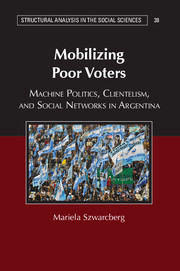Book contents
- Frontmatter
- Dedication
- Contents
- Acknowledgments
- 1 Mobilizing Poor Voters
- 2 The Microfoundations of Political Clientelism
- 3 Building a Party Network: Political, Partisan, and Social Networks in Argentina
- 4 Moral Hazard and Asymmetric Information Networks
- 5 The Logic of Perverse Incentives
- 6 Scaling Up: The Logic of Perverse Incentives at the Subnational Level
- 7 Mobilizing Poor Voters: A Comparative Perspective
- 8 Conclusions: Winners Lose
- Notes
- References
- Index
1 - Mobilizing Poor Voters
Published online by Cambridge University Press: 05 November 2015
- Frontmatter
- Dedication
- Contents
- Acknowledgments
- 1 Mobilizing Poor Voters
- 2 The Microfoundations of Political Clientelism
- 3 Building a Party Network: Political, Partisan, and Social Networks in Argentina
- 4 Moral Hazard and Asymmetric Information Networks
- 5 The Logic of Perverse Incentives
- 6 Scaling Up: The Logic of Perverse Incentives at the Subnational Level
- 7 Mobilizing Poor Voters: A Comparative Perspective
- 8 Conclusions: Winners Lose
- Notes
- References
- Index
Summary
One week before the rally, Mario, the local party broker, stopped by Laura's house. Laura is a single mother with three children. After asking her about her children, Mario reminded Laura of the upcoming rally and noted that “a lot of people were waiting to get on a social welfare program like the one she was receiving thanks to him.” The message was unmistakable. If Laura wanted to continue receiving benefits from the welfare program, she would have to attend the rally. She asked Paula, her young teenage neighbor, to look after her five-year-old son, her toddler daughter, and her infant Juancito. In exchange, Laura agreed to give Paula some money and whatever she received for attending the rally. When Laura returned home, she realized that Juancito was unusually quiet and unresponsive. Worried, she took him to Mario's house. Mario drove her to the hospital and waited until she spoke with the doctors. Laura's baby had serious brain damage. Years later, Laura would learn that Juancito fell from the bed where his siblings were playing. Scared or inattentive, Paula left him quietly in his cradle. Today, Juancito lives in a special state institution that is paid for by a pension that Mario “helped to get.”
Laura's story illustrates the complex relationship between poor voters and party brokers. On the one hand, if Mario had not forced Laura to attend the rally, she would have stayed with her children and Juancito may have never been injured. On the other, if Mario had not taken her to the hospital and secured a pension for Juancito's care, Laura's situation would have been even worse.
This book explores the mechanisms that explain the simultaneous consolidation of clientelism and democracy by studying the relationships between brokers and voters and between brokers and bosses in Argentina. I argue that while democracy has created new spaces for representation and political accountability, it has also created incentives for cultivating clientelistic relationships. Using network analysis to study the nested relationships between party bosses, brokers, and voters, this book reveals a logic of perverse incentives that induces brokers to employ clientelistic strategies to mobilize poor voters.
- Type
- Chapter
- Information
- Mobilizing Poor VotersMachine Politics, Clientelism, and Social Networks in Argentina, pp. 1 - 21Publisher: Cambridge University PressPrint publication year: 2015



